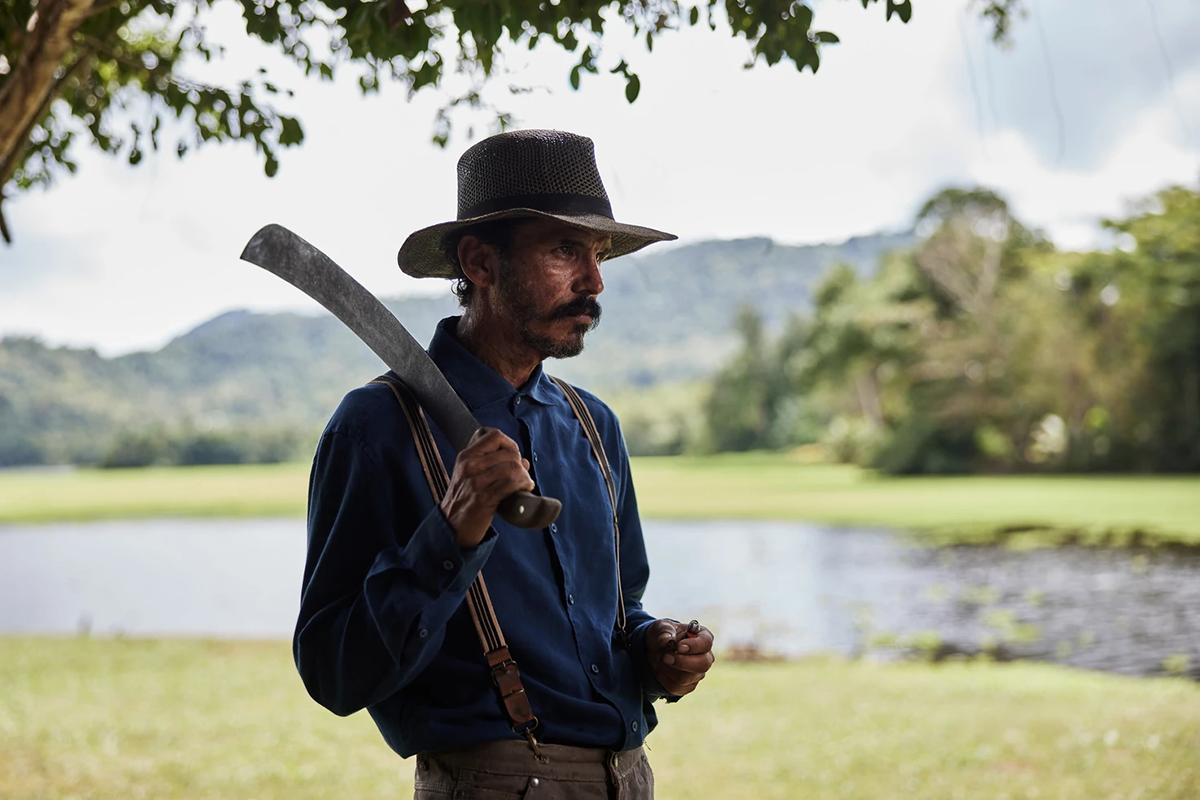Touted as a samurai western film with Boricua flavor, Ray Figueroa’s Érase una Vez en el Caribe (2023) invites us to confront our nation’s past via the violence of colonization. In doing so, the director and screenwriter takes us on an epic journey of revenge, resistance, and love through the lens of the jibaro working class, asking, how far would you go for all you hold dear?
Set in the tumultuous 1930s Puerto Rico – an era when the island’s sugarcane industry was largely owned by U.S. interests – Érase una Vez en el Caribe opens with a workers’ strike at one of the large haciendas. This is our first glimpse of the brutal colonial exploitation as the American hacienda owner’s henchmen respond to the strike with a brutal attack.
Here’s where we also meet the much-feared and revered Juan Encarnación (played by Héctor Aníbal), a former plantation foreman known for his incomparable skill with the machete. He confronts the oppressive landowners who attempted to intimidate the workers into not striking.
What those of us who come from a clase obrera family relate to is Encarnación’s unflinching commitment to justice – the sense of right and wrong. Sometime later he finds his beloved wife Pura (Essined Aponte) has been kidnapped by bandits working for the son of wealthy yanqui Dos Soles hacienda owner, Mr. Walker (to whom they refer as simply, El Mister). We soon learn she is to be married off to Walker, Jr. and it becomes evident this Caribbean version of Once Upon a Time is really a tale of vengeance. Encarnación then sets off with their daughter, Patria, in tow to find Pura – at any cost. But while we expect there to be bloodshed (the jibaro’s machete playing both a literal role – for cutting sugarcane/killing adversaries and – a metaphoric one in Puerto Rican culture. It symbolizes resistance) we do not know how the story will end.
The captivating cinematography of Willie Berríos transports us between different timelines, allowing us to further contextualize the main character’s background history. For example, when seated at the dinner table of their once elaborately furnished plantation-style home, Pura quietly spoons her dismal bowl of soup in disgust, while her older sister complains they haven’t had anything decent to eat in weeks. Everything from the girls’ simple dresses to the lighting in the dining room to even the color of the soup foreshadows the destitute conditions to come.
When Pura’s father, Don Segundo Urrutia (Fele Martínez) learns the cook left the night before, we hear the indignation in his wife’s voice as she urges her husband to borrow ‘more money from the American businessman he works for.’ The desperation on his face is palpable, hinting at how his entire house staff, wife, and eldest daughter will soon abandon him. We find Don Segundo left with nothing but a mostly empty home – even much of the furniture is gone – refusing to leave, drowning in debt and in alcoholism.
All of this brings us back to the question of the lengths people go to keep their home, family and [in the case of Don Segundo] a lavish lifestyle. It also reminds us Pura’s family and their workers are just another casualty of colonization.

Which brings me to another point the film tackles surrounding our socio-economic-political label ‘U.S. territory’ (code for colony). Director and screenwriter Figueroa plays with juxtaposition, not only of timelines, but also between the themes of resistance and love. While Encarnación continues his vengeful murderous path, bringing him closer to finding Pura and her capturers, we witness those on the other side – those who instead of resisting their oppressors, side (and work) with them. These are the folks who have little love of country and are willing to sell it, just like los estadistas who want us to be #51 and encourage displacement by rich non-Puerto Rican descended Americans, taking advantage of Ley 22/60.
While Érase una Vez en el Caribe is set in a Borikén archipelago decades past, its themes are still relevant today. There’s a machete fight scene towards the end where one of El Mister’s underlings is kneeling, holding his abdomen after being wounded. Pura, standing in front of him, disgustingly tells him, “You live your life arrodillao” (on his knees, referring to his allegiance to the yanquis who exploit and abuse his people). “They (the yanquis) buy us, but you’re the kind that sells us.”
It’s a sentiment that deeply resonates with me. It also reminded me of a line in one of my poems, Nuyorican, Not, “Colonia no es un perfume.” We’ve got a long way to go for folks to stop romanticizing our colonial status, to stop believing the myth that we owe the gringos anything after all they’ve stolen from us. The fact remains, we all know it’s going to take more than a jibaro’s machete to end over 500 years of colonization of Puerto Rico.

